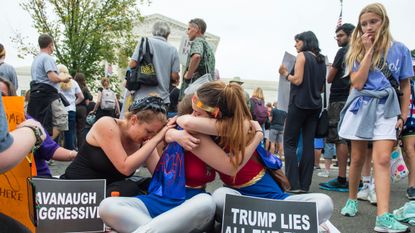
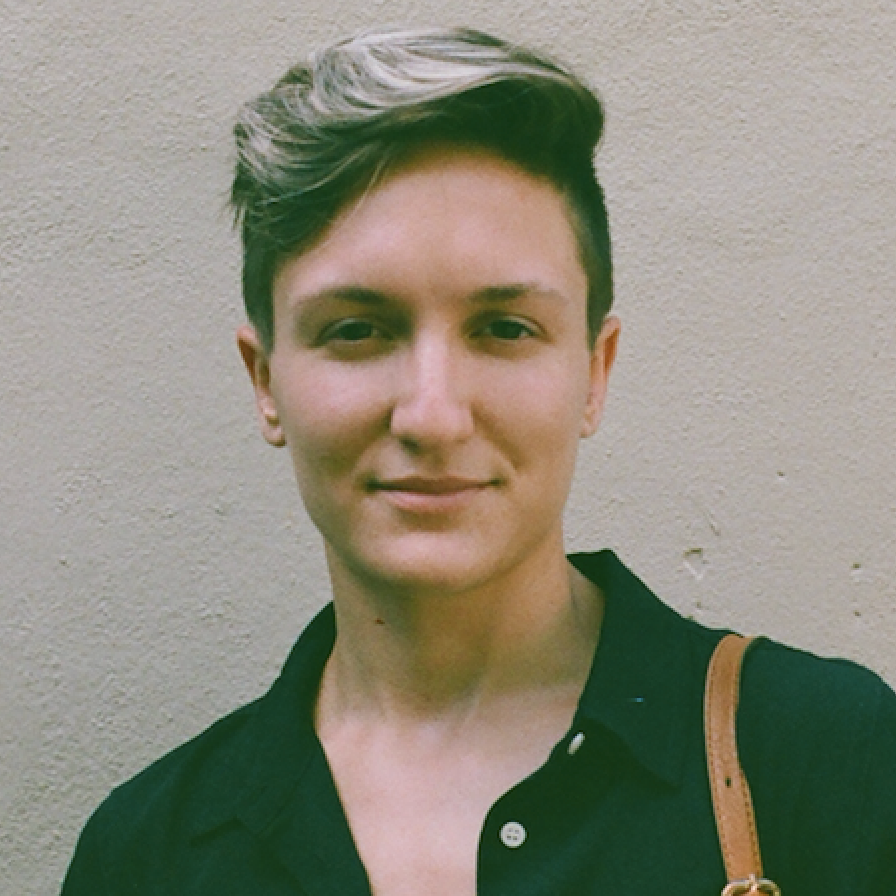
Brett Kavanaugh was confirmed to the Supreme Court on Saturday, despite allegations of sexual misconduct from Dr. Christine Blasey Ford and three other women (allegations Kavanaugh denies). He was confirmed despite yelling at and interrupting senators who questioned him during his testimony on Sept. 27. Then, on Monday, President Trump—a man who joked about grabbing women by their genitals without their permission—called Ford’s allegations a “hoax.” Survivors of sexual violence were reminded yet again why our stories don’t matter. The seven in 10 sexual assault survivors who don’t report their assaults were reminded why we stayed silent. We feel alone.
One thing that always surprises me about cultural conversations about sexual assault is how many people passively consume my trauma. When I share my story, I receive silent “likes” and retweets, but few actual messages of support. I can count the number of men in my life who spoke out in support of Ford on one hand. And that’s why Kavanaugh was confirmed: Our culture is one that still leaves survivors to fend for themselves.
To change that, we have to start publicly, vocally, and directly supporting survivors. Here’s how we can do that.
Share Support For Survivors Publicly
Everyone knows at least one survivor of sexual violence.
One in three women and one in six men in the United States have experienced sexual violence in their lifetime, according to the National Sexual Violence Research Center. Every time I write about sexual violence, a friend will tell me about their assault or rape. Almost all of the people I know who spoke out in support of Ford were women or nonbinary people, and the majority of them were survivors of sexual violence.
There’s a pattern in cultural conversations about sexual violence: Survivors reveal or describe their trauma in an effort to evoke reactions—emotional, powerful reactions that could help change our culture, or, in this case, that could’ve helped stop Kavanaugh’s confirmation. Other survivors support them, but many men and white women who aren’t survivors stay silent.
We need allies who are going to help us and reach out to us to make sure we’re not breaking.
If Kavanaugh’s confirmation proves anything, it’s that silence from non-survivors isn’t helping to change conversations about sexual assault. If you didn’t talk about Kavanaugh’s confirmation publicly, the survivors in your life probably noticed. So now it’s time to speak up. If you want to help end sexual assault or you want to show that you support survivors, you have a moral obligation to publicly support their cause in some fashion—especially if you’re a man. Women are more likely to be victims of sexual assault, and men are more likely to commit sexual assault in communities where it often goes unpunished.
Stay In The Know
Marie Claire email subscribers get intel on fashion and beauty trends, hot-off-the-press celebrity news, and more. Sign up here.
Men should start conversations with their male friends about consent or about Kavanaugh. They can share messages of support for survivors on social media. White women—53 percent of whom voted for Trump—also need to call out their friends who attack survivors on social media or in conversations after Kavanaugh’s confirmation.
If you don’t know anyone who is out as a survivor, that doesn’t mean you don’t know someone who hasn’t suffered privately. Create a space where they feel they could come to you and be believed.
Reach Out To The Survivors In Your Life
Much like Ford said she remembers Kavanaugh and Mark Judge’s laughter during her alleged assault, I remember my assailant’s laughter and his breath on the back of my neck. In days like the day after Kavanaugh’s confirmation, I perform a ritual: I relive my trauma, and then I list reasons for why my assault was actually an assault. I try to re-convince myself. I try to forgive myself.
I have one male friend who contacts me every time there’s difficult news about sexual assault. After Ford’s testimony, he reached out and asked how I was doing. He said he was checking on all the survivors in his life. Late Saturday evening, he messaged me again: “...want to tell you that you are a great person and a good friend. You have worth and value.”
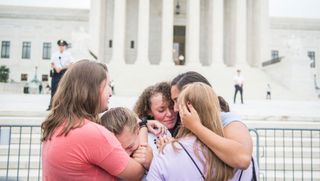
Simple messages to the survivors you know that reaffirm your support and love for them can help break cycles of shame and self-blame. Telling a survivor you believe them is one of the first steps toward disrupting the culture of silence that surrounds sexual assault—the same culture that kept Ford silent for so long and that makes public discussion of sexual violence “inappropriate” or awkward.
Donate To Sex Education and Anti-Sexual Violence Organizations
Many advocates believe that stopping sexual violence starts with scientifically accurate and comprehensive sex education. One in four girls and one in six boys will be sexually abused before they turn 18, according to nonprofit Invisible Children. Advocates believe children won’t be able to tell adults about abuse if they don’t know the correct terms for their body parts—or if they don’t know what abuse is in the first place.
I was 19 when I was assaulted, and at that time I thought rape was something that happened in Law & Order: Special Victims Unit episodes. I didn’t know that attempted rape was a crime. I didn’t even know what consent was.
To support comprehensive sex education programs, donate to nonprofits like Answer, Advocates for Youth, or Planned Parenthood. Or, better yet, donate and start a public fundraiser on Facebook or GoFundMe.
Elevate Marginalized Voices
Though the hashtag #BelieveWomen represents the majority of sexual assault survivors who are women, it is alienating to nonbinary and trans survivors like myself. As a nonbinary person, I sometimes feel as though I can’t “claim” to be a survivor if I’m not also a woman—or I feel like my experience isn’t as powerful if I’m not a part of the statistic of one in three women.
Recognizing that LGBTQ people, people of color, and people with disabilities, for example, are more likely to experience sexual violence is critical if we hope to build a culture and society where everyone feels safe reporting sexual assault or rape. The hashtag #BelieveSurvivors was widely used before and after Ford’s testimony, and it helped create a space where I felt like my experience and my identity were valid. Sexual violence becomes more pervasive as marginalized identities overlap, and white-washing or cis-washing the issue erases the stories of those who are already silenced by racial injustice, economic inequality, or disability discrimination.
During Ford’s testimony, New York Magazine’s Irin Carmon tweeted this:
There's something heartbreakingly idealistic about Christine Blasey Ford believing the senators in charge would genuinely want to hear from her before they voted.September 27, 2018
But Ford’s idealism is one that many survivors feel. That’s why we keep picking the scabs off our wounds and allowing the world to look at them again—we want to help change this culture, and, having lived through our own pain, we think it’s powerful enough to move others.
But we keep being let down. We wrap up our wounds and let them scab over again—for now. So, please, we need support. We need allies who are going to help us and reach out to us to make sure we’re not breaking.
RELATED STORY
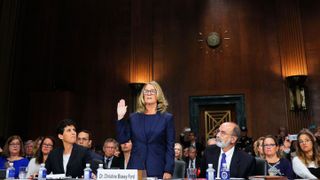
-
 Olivia Rodrigo Finds the Perfect Spring Dresses at Reformation
Olivia Rodrigo Finds the Perfect Spring Dresses at ReformationShe's worn the brand twice in the past week.
By Julia Marzovilla Published
-
 Curiously, Just as Meghan Markle Sends Samples of Her New Strawberry Jam Out, the Buckingham Palace Shop Starts Promoting Its Own Strawberry Jam on Social Media
Curiously, Just as Meghan Markle Sends Samples of Her New Strawberry Jam Out, the Buckingham Palace Shop Starts Promoting Its Own Strawberry Jam on Social MediaThe clip promoting the Buckingham Palace Shop’s product—we cannot make this up—is set to Mozart’s “Dissonance Quartet.”
By Rachel Burchfield Published
-
 Zendaya's Latest 'Challengers' Serve Is Nearly a Century Old
Zendaya's Latest 'Challengers' Serve Is Nearly a Century OldThe 1930s-era dress may have been pulled months ago.
By Halie LeSavage Published
-
 36 Ways Women Still Aren't Equal to Men
36 Ways Women Still Aren't Equal to MenIt's just one of the many ways women still aren't equal to men.
By Brooke Knappenberger Last updated
-
 How New York's First Female Governor Plans to Fight for Women If Reelected
How New York's First Female Governor Plans to Fight for Women If ReelectedKathy Hochul twice came to power because men resigned amid sexual harassment scandals. Here, how she's leading differently.
By Emily Tisch Sussman Last updated
-
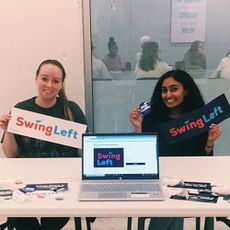 Why the 2022 Midterm Elections Are So Critical
Why the 2022 Midterm Elections Are So CriticalAs we blaze through a highly charged midterm election season, Swing Left Executive Director Yasmin Radjy highlights rising stars who are fighting for women’s rights.
By Tanya Benedicto Klich Published
-
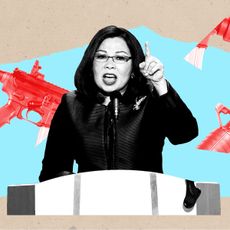 Tammy Duckworth: 'I’m Mad as Hell' About the Lack of Federal Action on Gun Safety
Tammy Duckworth: 'I’m Mad as Hell' About the Lack of Federal Action on Gun SafetyThe Illinois Senator won't let the memory of the Highland Park shooting just fade away.
By Sen. Tammy Duckworth Published
-
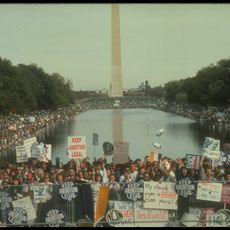 Roe Is Gone. We Have to Keep Fighting.
Roe Is Gone. We Have to Keep Fighting.Democracy always offers a path forward even when we feel thrust into the past.
By Beth Silvers and Sarah Stewart Holland, hosts of Pantsuit Politics Podcast Published
-
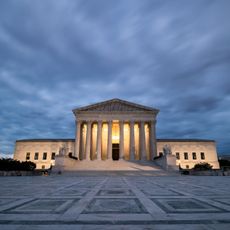 The Supreme Court's Mississippi Abortion Rights Case: What to Know
The Supreme Court's Mississippi Abortion Rights Case: What to KnowThe case could threaten Roe v. Wade.
By Megan DiTrolio Published
-
 Sex Trafficking Victims Are Being Punished. A New Law Could Change That.
Sex Trafficking Victims Are Being Punished. A New Law Could Change That.Victims of sexual abuse are quietly criminalized. Sara's Law protects kids that fight back.
By Dr. Devin J. Buckley and Erin Regan Published
-
 My Family and I Live in Navajo Nation. We Don't Have Access to Clean Running Water
My Family and I Live in Navajo Nation. We Don't Have Access to Clean Running Water"They say that the United States is one of the wealthiest countries in the world. Why are citizens still living with no access to clean water?"
By Amanda L. As Told To Rachel Epstein Published